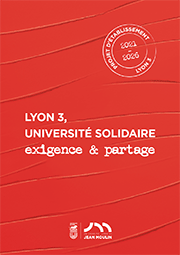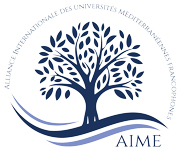AccueilRechercheProgrammes et productions scientifiquesThèsesThèses soutenuesThèses soutenues - 2006-2021Thèses soutenues - 2018
-
Partager cette page
- Recherche,
NZAOU-KONGO Aubin Rémi Frédéric
L’exploitation des hydrocarbures et la protection de l’environnement en République du Congo. Essai sur la complexité de leurs rapports à la lumière du droit international
Publié le 20 février 2018 – Mis à jour le 13 décembre 2018
Thèse en Droit mention Droit mention Droit international, Européen et Comparé, soutenue le 16 février 2018.
L’étude a pour objet d’analyser les rapports qui peuvent être établis entre l’exploitation des hydrocarbures et la protection de l’environnement en République du Congo. Malgré son intitulé, il s’agit d’une étude de droit international, dans laquelle le droit de la mer et surtout le droit international de l’environnement contribuent par leurs règles respectives à limiter les conditions d’exercice des activités d’exploitation des hydrocarbures. C’est – en effet – sous le prisme du développement en droit international et d’une évolution internationale presque continue, que ces rapports, appréciés dans le cadre du droit national congolais, peuvent revêtir leur pleine signification. L’étude fait le constat d’une exclusion mutuelle, pour des raisons qui tiennent à la fois à la priorité nationale reconnue à l’exploitation des hydrocarbures et à la faiblesse encore significative des règles environnementales, telles qu’elles sont transcrites en droit interne. Elle permet de fonder ce constat sur une approche isolée de chacune d’entre elles, qui limite les possibilités d’interaction réciproque. Rendant ces deux régimes peut complémentaires. S’appuyant sur l’exigence soulignée par le CIJ en 1997 d’une conciliation nécessaire entre eux, l’étude montre comment l’émergence en droit international de cette démarche de conciliation est traduite en droit interne sous l’effet de la dynamique du développement durable. Il en résulte, malgré la prudence nécessaire d’un pays en développement, qui ne peut compter pour l’instant que sur cette rente économique et financière, une volonté affirmée par les autorités nationales d’adopter une gestion rationnelle de l’exploitation. ? cet égard, l’action positive de la conciliation devient, dans un contexte de crise climatique et de nécessité d’une nouvelle orientation vers la transition énergétique, le vecteur de cette transformation profonde qui doit se concrétiser par une réforme juridique de même ampleur, intégrant la gestion de l’ensemble des ressources énergétiques dans un cadre juridique intégré et favorable à la disparition progressive de ces ressources carbonées et leur remplacement par des énergies plus propres et renouvelables.
The purpose of the study is to analyze the relationships that can be established between the exploitation of hydrocarbons and the protection of the environment in the Republic of Congo. Despite its title, it is a study of international law, in which the law of the sea and especially international environmental law contribute by their respective rules to limit the conditions for the exercise of the activities of exploitation of the hydrocarbons. It is - indeed - under the prism of development in international law and of an almost continuous international evolution, that these relations, appreciated within the framework of the Congolese national law, can take full significance. The study finds a mutual exclusion, for reasons that are due both to the national priority recognized for the exploitation of hydrocarbons and the still significant weakness of environmental rules, as transcribed in domestic law. It makes it possible to base this observation on an isolated approach of each of them, which limits the possibilities of reciprocal interaction. Making these two schemes lowly complement to each other. Based on the requirement emphasized by the ICJ in 1997 of a necessary conciliation between them, the study shows how the emergence in international law of this process of conciliation is translated into domestic law under the effect of the dynamics of the sustainable development. As a result, in spite of the necessary prudence of a developing country, which can only count on this economic and financial rent for the moment, the will of the national authorities to adopt a rational management of the exploitation. In this respect, the positive action of conciliation becomes, in the context of a climate crisis and the need for a new orientation towards the energy transition, the vector of this profound transformation which must be translated into legal reform of the same magnitude. integrating the management of all energy resources into an integrated legal framework favorable to the gradual disappearance of these carbon resources and their replacement by cleaner and renewable energies.
The purpose of the study is to analyze the relationships that can be established between the exploitation of hydrocarbons and the protection of the environment in the Republic of Congo. Despite its title, it is a study of international law, in which the law of the sea and especially international environmental law contribute by their respective rules to limit the conditions for the exercise of the activities of exploitation of the hydrocarbons. It is - indeed - under the prism of development in international law and of an almost continuous international evolution, that these relations, appreciated within the framework of the Congolese national law, can take full significance. The study finds a mutual exclusion, for reasons that are due both to the national priority recognized for the exploitation of hydrocarbons and the still significant weakness of environmental rules, as transcribed in domestic law. It makes it possible to base this observation on an isolated approach of each of them, which limits the possibilities of reciprocal interaction. Making these two schemes lowly complement to each other. Based on the requirement emphasized by the ICJ in 1997 of a necessary conciliation between them, the study shows how the emergence in international law of this process of conciliation is translated into domestic law under the effect of the dynamics of the sustainable development. As a result, in spite of the necessary prudence of a developing country, which can only count on this economic and financial rent for the moment, the will of the national authorities to adopt a rational management of the exploitation. In this respect, the positive action of conciliation becomes, in the context of a climate crisis and the need for a new orientation towards the energy transition, the vector of this profound transformation which must be translated into legal reform of the same magnitude. integrating the management of all energy resources into an integrated legal framework favorable to the gradual disappearance of these carbon resources and their replacement by cleaner and renewable energies.
Mots-clés :
Activité de l’amont, Application nationale, Bouquet énergétique, complexité juridique, Conciliation, Défis énergétique, Dynamique de conciliation, Droit international, Droit de la mer, Droit international de l’environnement, Exploration des hydrocarbures, Exploitation des hydrocarbures, Fonds vert, Mix énergétique, Protection de l’environnement, Rapports juridiques, Réchauffement climatique, République du Congo, Ressources fossiles, Transition écologique, Transition énergétique
Keywords :
Upstream activity, National application, Energy mix, Legal complexity, Conciliation, Energy challenges, Conciliation dynamics, International law, Law of the sea, International environmental law, Exploration of hydrocarbons, Hydrocarbon exploitation, Green fund, Energy mix, Environmental protection, Legal relations, Global warming, Republic of the Congo, Fossil resources, Ecological transition, Energy transition.
Directeur(s).trice(s) de thèse : M. Stéphane DOUMB?-BILL?
Activité de l’amont, Application nationale, Bouquet énergétique, complexité juridique, Conciliation, Défis énergétique, Dynamique de conciliation, Droit international, Droit de la mer, Droit international de l’environnement, Exploration des hydrocarbures, Exploitation des hydrocarbures, Fonds vert, Mix énergétique, Protection de l’environnement, Rapports juridiques, Réchauffement climatique, République du Congo, Ressources fossiles, Transition écologique, Transition énergétique
Keywords :
Upstream activity, National application, Energy mix, Legal complexity, Conciliation, Energy challenges, Conciliation dynamics, International law, Law of the sea, International environmental law, Exploration of hydrocarbons, Hydrocarbon exploitation, Green fund, Energy mix, Environmental protection, Legal relations, Global warming, Republic of the Congo, Fossil resources, Ecological transition, Energy transition.
Directeur(s).trice(s) de thèse : M. Stéphane DOUMB?-BILL?
Membres du jury :
Benjamin BOUMAKANI, Rapporteur, Secrétaire général du Gouvernement du Congo, Ma?tre de conférences habilité à diriger des recherches, Université Marien Ngouabi, Brazzaville (CONGO),
M. Stéphane DOUMBE-BILL?, Directeur de thèse, Professeur des universités, Université Jean Moulin Lyon 3,
M. Francis HAUMONT, Professeur extraordinaire émérite, Université Catholique de Louvain (BELGIQUE),
M. Mohamed Ali MEKOUAR, Rapporteur, Ancien Professeur des universités, Professeur associé, Université de Casablanca (MAROC),
Mme Nathalie ROS, Professeure des universités, Université Fran?ois-Rabelais, Tours
Président.e du jury : Mme Nathalie ROS
Equipe d'accueil : ?quipe de droit public
Benjamin BOUMAKANI, Rapporteur, Secrétaire général du Gouvernement du Congo, Ma?tre de conférences habilité à diriger des recherches, Université Marien Ngouabi, Brazzaville (CONGO),
M. Stéphane DOUMBE-BILL?, Directeur de thèse, Professeur des universités, Université Jean Moulin Lyon 3,
M. Francis HAUMONT, Professeur extraordinaire émérite, Université Catholique de Louvain (BELGIQUE),
M. Mohamed Ali MEKOUAR, Rapporteur, Ancien Professeur des universités, Professeur associé, Université de Casablanca (MAROC),
Mme Nathalie ROS, Professeure des universités, Université Fran?ois-Rabelais, Tours
Président.e du jury : Mme Nathalie ROS
Equipe d'accueil : ?quipe de droit public
Décision : Admis
Documentation
Mise à jour : 13 décembre 2018







